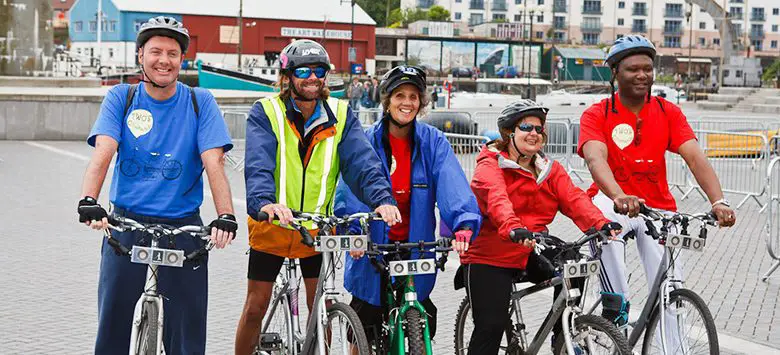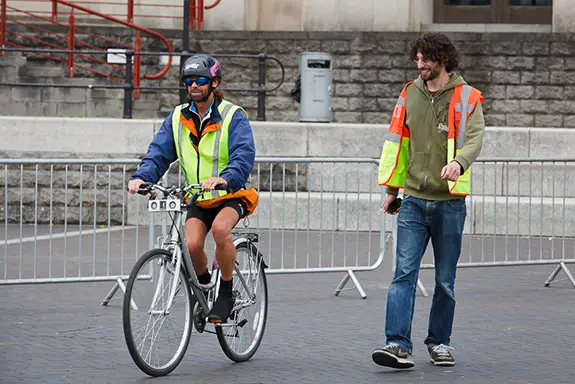
UltraBikes keep blind cyclists on track
“Can I go round again?” Michael Smith’s question was greeted with cheers and applause for good reason. Michael, a blind cyclist and Paralympic footballer, was riding solo round a 150 metre outdoor course and his success was contagious.
It was a scene that was repeated many time over at Lloyds Amphitheatre, Bristol, as throughout the day as blind and visually impaired cyclists, some as young as 12, took to the track on specially adapted UltraBikes during the world’s first Miracle of Science challenge.
Presented by Life Cycle UK, a Bristol-based charity that champions cycling for everyone, the participants included Paralympic footballer Michael Smith, who has only 7% vision due to the rare genetic condition, Leber’s Optic Neuropathy. With a little practice he was able to ride safely and independently around a simply constructed cycle track, a feat he hasn’t been able to attempt since losing his sight three years ago.
It was all made possible by the UltraBike’s specially designed ultrasonic sensors which detect obstacles in the cyclist’s path, similar to those used in the UltraCane, a high-tech white cane. The rider receives constant directional feedback of obstacles through vibrating buttons on each side of the handlebars, to allow safe navigation around the course.
Michael, a keen back tandem rider explained; “I was surprised at how quickly I felt confident. Once you put your trust in the technology it becomes very intuitive and you effectively become part of the bike. It completely fills the void. It is brilliant.”
Close to the track a team of trained volunteers in a designated practice area helped all the cyclists take as much time as they needed to prepare, and in some cases, learn new cycling skills. The volunteers also shadowed the riders on the cycling track to make sure even the confident cyclists remained safe at all times.
Business owner, Sally Rodriguez, whose sight started to deteriorate in her teens, said that her UltraBike experience was; “the stuff dreams are made of.”
“There is a lack of opportunity for blind and visually impaired people to exercise outside and this is so empowering. It is amazing that the UltraBike technology allows you to correct your course. I am loving the experience,” she added.
Julie Davies from Sound Foresight Technology, developers of the UltraBike, said; “with this new development we aim to give blind and visually impaired people the opportunity to discover how the technology could give them a new feeling of freedom and independence in a controlled cycling environment. We believe the technology can be further enhanced for bikes in a velodrome setting and this is something we are currently investigating.”
Last year the BBC commissioned Sound Foresight Technology to create the first UltraBike for the Richard Hammond series, Miracles of Nature. The programme explained how the navigational abilities of bats have been copied to give blind people an effective way to detect and avoid obstacles.
During the programme Michael Smith’s twin brother, Dan, a keen cyclist before he too lost his sight to a rare genetic condition, was seen safely negotiating his way along a woodland path on the first ever UltraBike.
The developers of the technology are now considering the possibility of holding similar events at other locations around the country.
For more information about Life Cycle UK and its Two’s Company supported tandem ride for blind and visually impaired adults and children, visit the website, contact via email or call 0117 353 4580.
For information about the UlltraCane and the UltraBike, ring Sound Foresight Technology on 01423 359711 or visit their website.
By Ruth Badley
Check out…
- UltraCane: 21st century walking sticks
- Designed2enable: assisted living products
- RaceRunning: have you heard of this athletic disability sport?
Do you know of any new and innovative technology helping disabled people that we should be shouting about? Get in touch by messaging us on Facebook, tweeting us @DHorizons, emailing us at editor@disabilityhorizons.com or leaving your comments below.
